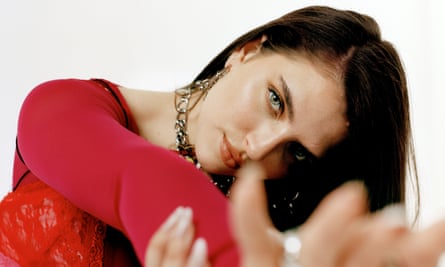Eurovision Calling review – a brief, blah beginners’ guide to the contest that gave us Abba … and Scooch
Eurovision Calling: Jason and Chelcee’s Ultimate Guide is the calm before the storm of the semi-finals, which begin on Tuesday. To call this hour-long whiz through the basic history of the event an “ultimate guide” is a touch misleading. The presenters, comedian Jason Manford and footballer/musician Chelcee Grimes, are fairly clear that it’s more of a beginners’ guide, and Manford aims much of his shtick at newcomers or recent converts. As a result, it’s not likely to enlighten any hardcore fans, but it might convince the previously unpersuaded to have a look.
Manford kicks things off by admitting that until last year, he had largely ignored the competition. It wasn’t until he watched Sam Ryder, “full of joy, looking like Jesus”, romping to second place in 2022 behind a triumphant Ukraine, that he thought it might be worth paying more attention. So here he is, Jason Everyman-ford, learning all that he can about the event and its fans.
It’s bound to be fun, given the subject matter, and the fact that the UK is hosting this year for the first time since 1998. Grimes plays the expert to Manford’s naif, coaching him through the basics and visiting Sweden, a nation which takes Eurovision and the selection of its national entry more seriously than perhaps any other country. There, she meets Loreen, of Euphoria fame, who is representing Sweden for the second time this year and is by far the bookies’ favourite.
Manford, meanwhile, goes to Manchester and Newcastle to find out what makes its superfans love it so much – after all, more than 161 million people watched last year, and sometimes, that figure can be closer to 200 million. You can imagine Louis Theroux doing a documentary about the most devoted of Eurovision fans. In Newcastle, Manford meets the Ward family, who have inherited their love of the contest from their grandmother, who remembers watching it in 1959. The poor Wards have to decorate their house as if the contest is happening (at least, I think so, unless it’s always like that?), but I did enjoy the dad’s “rhythm and booze” cabinet idea, in which they try to sample a drink from every country with a song they like. Manford also spends some time in Manchester’s gay village, with the LGBTQ+ community, “to find out why they like it so much”, and hears moving stories about why it holds such hallowed status for many.
Eurovision Calling is stuffed with statistics, facts and archive footage, both legendary (Abba, Dana International, Conchita Wurst) and … also legendary, but in another lane (Scooch, Electro Velvet, poor old James Newman). There is a bit of pop science, as an academic discusses a study suggesting that there is a greater reported life satisfaction in nations who do participate, as opposed to those who don’t, though given the current state of this nation, Liverpool has got a lot of heavy lifting to do in 2023. Manford meets Katrina of Katrina and the Waves, who last brought it home for Britain in 1997, and the lovely Sam Ryder, who acknowledges that it can be a “poison chalice for some people”. He also meets this year’s entry Mae Muller, who says that the run-up to the big night is “insanity” and seems a touch overwhelmed.

This is very much an overview; if you are surprised to learn that a young Céline Dion once represented Switzerland, then it may be the kind of primer that you need. For more devoted fans, it’s going to be too surface and too slight. For example, it’s as if Graham Norton never existed. It pays tribute to Terry Wogan – Katrina recalls the late presenter introducing her to a Black Velvet (Guinness and champagne) at the hotel bar on the night that she won – but surely it could spare five minutes to acknowledge Norton’s role as a Eurovision staple. It’s also a bit slapdash, leaning on blah statements about how having a really good song matters, or that it’s worth making the performance a bit camp. There is plenty of fascinating statistical analysis around, particularly about what tends to make a song a winner (spoiler alert: it isn’t looking good for Muller’s I Wrote A Song), but this is more likely to let you know that in 1994, Eurovision hosts Ireland catapulted Michael Flatley’s Riverdance into the international spotlight.
Not one for the fanatics, then, but more of a gentle guide, aimed at tentatively nudging those who may be considering dipping a toe into the water for the first time. “What would you say to people who’ve never got into Eurovision before?” Manford asks Muller. “Buckle up,” she says.
after newsletter promotion
-
Eurovision Calling: Jason and Chelcee’s Ultimate Guide aired on BBC One and is on BBC iPlayer.
For more latest TV News Click Here

